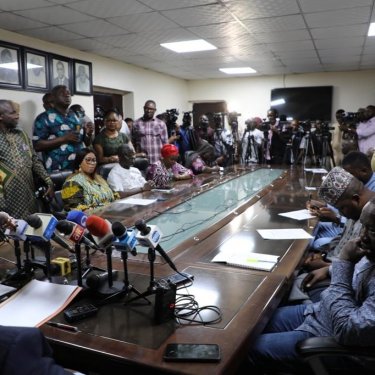Radio station closures and arbitrary arrests signal press freedom decline in Nigeria

Reporters Without Borders (RSF) is alarmed about a decline in press freedom Nigeria, where 53 public and privately-owned radio stations have been suspended and are threatened with permanent closure, and at least 15 journalists have been arrested (and five physically attacked) in the past three months, according to RSF’s tally.
One radio station in ten now risks losing its licence after the National Broadcasting Commission (NBC), Nigeria’s broadcasting regulator, carried out its threat to suspend 53 radio stations for not paying their licence fees – a decision that comes amid an increase in violence against journalists and media.
“The NBC decision to suspend the licences of more than 50 radio stations deprives millions of people of their right to news and information, although those running these radio stations are ready to dialogue to find long-term solutions that benefit everyone,” said Sadibou Marong, the director of RSF’s West Africa bureau. “Many media outlets operate in conditions that are precarious and sometimes threaten their safety. The authorities have a duty to remedy these obstacles to press freedom.”
A statement issued by the NBC on 19 August listed 53 public and privately-owned radio stations that had not paid their licence fees and gave them until 20 August to pay – a deadline that was subsequently extended until 24 August. How much each station is supposed to pay ranges from 1 million to 20 million naira (2,500 to 47,000 euros), depending on whether it is public or privately-owned, or a community radio station. The overall sum sought from the 53 radio stations is 2.6 billion naira (6 million euros).
RSF has talked to owners and managers of affected radio stations, some of whom have appealed to the authorities to reduce the licence fees and say it is unfair to demand payment for five years in advance. Others, such as Raypower Networks, the owner Ray Power FM, have opted to enter into negotiations with the NBC.
The economic environment for journalists in Nigeria is very precarious and media are often threatened with suspension. As well as these economic difficulties, journalists are also often subjected to of arbitrary arrest and detention, and even physical violence.
15 journalists arrested since June
Since June, at least 15 journalists have been arrested and held for up to two days on spurious grounds and, in most cases, arbitrarily. The latest victim was CrossRiver Watch reporter Agba Jalingo, who was arrested at his Lagos home on 21 August over an article about the University of Abuja’s law faculty. Police officers also harassed his wife and children for several hours.
On 22 July, police raided the Abuja headquarters of Peoples Gazette, a very popular online newspaper, with the aim of arrest managing editor Samuel Ogundipe and reporter Adefemola Akintade over a 23 June article about the ICPC anti-corruption agency. In their absence, the police briefly detained five other members of its staff – Ameedat Adeyemi, Grace Oke, Sammy Ogbu, Justina Tayani and deputy managing editor John Adenekan.
“We were arrested in the course of our work,” Adenekan told RSF. “Hounding people for doing their work is not acceptable. Journalism is not a crime. One only hopes that authorities remain committed to press freedom without succumbing to pressures from unlawful quarters."
Access to the Peoples Gazette website was blocked last year after it reported that privileges had been granted to the son of a member of the president’s staff.
Some media outlets, including the Daily Trust newspaper and the British public broadcaster, the BBC, have also been threatened with bans in connection with their coverage of armed groups in the northwest of the country. RSF points out that covering all aspects of a conflict is part of independent journalism’s job.
Nigeria is ranked 129th out of 180 countries in RSF's 2022 World Press Freedom Index.
